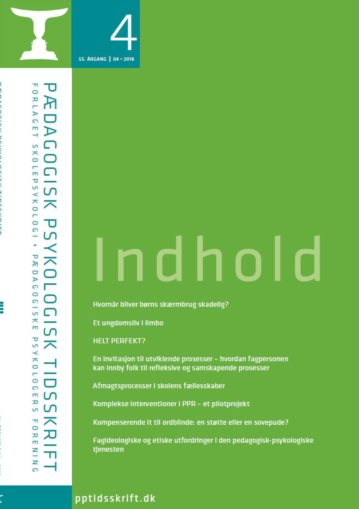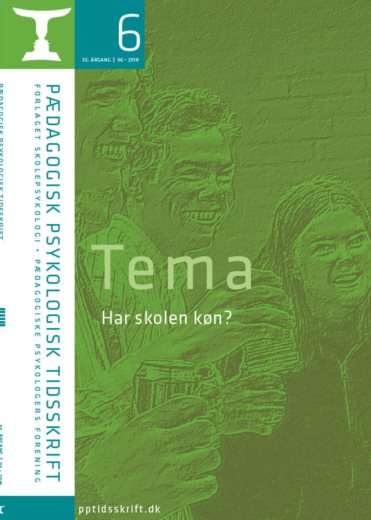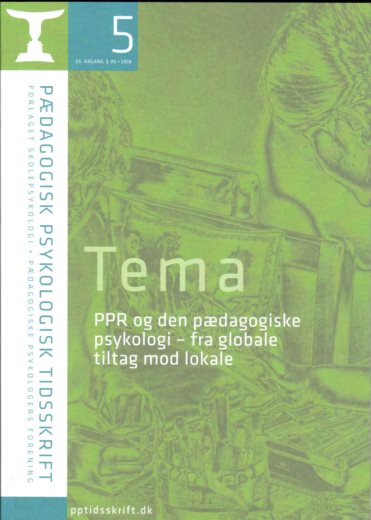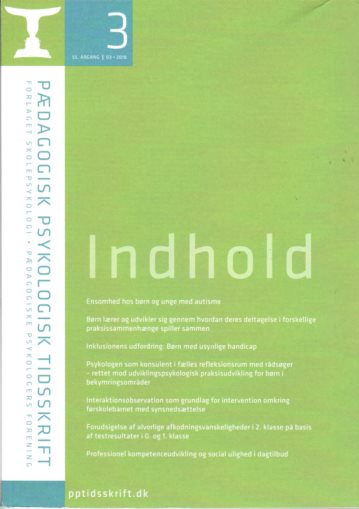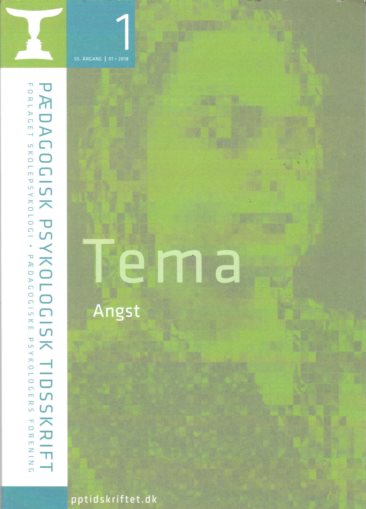Beskrivelse
Abstracts 4/2018
When does children’s screen use become harmful?
by Stella Karina Mezzolla Pedersen
This study asserts the importance of creating general guidelines in the field of screen time and screen use for children and youth . It attempts to clarify if it is pos- sible to define a threshold for harmful effects of screen time . Some countries have general guidelines stating that more than 2 hours a day should be avoided, but in Denmark, we have no such measures . Is it psychological difficulties that lead to ex- cessive screen use or is it excessive screen use that leads to psychological difficul- ties? The article concludes that it is necessary to take a broader perspective than that of family rules and habits alone . It must be taken into consideration that schools and Danish institutions, in general, are obliged to apply government de- mands of digitisation into the public school system, creating a whole new children’s culture . A critical stance towards this development is crucial .
“The fight for identity – Perspectives on the everyday life of adolescents with a refugee background”
by Ida Astrup Jørgensen
Through a socialconstructionistic framework, the study examines the subjectifica- tion of four unaccompanied adolescents with a refugee background at a residential facility in Denmark . Conceiving the perspectives of the adolescents and by using participant observation, interviews and photo-elicitation, the paper shows how they emerge through participation in various social and discursive practices . In different ways, they accept, challenge or dispute the available categories and positions as a way to establish themselves in the world . The paper argues that as a response to experiences of objectivity, power and categorisations, they refuse to disclose infor- mation about their private life as a way to retain a degree of agency and control .
Furthermore, the adolescents seem to internalise the awareness of the adults’ ob- jectification becoming more self-controlled in the presence of staff than in other so- cial situations or times of the day when the staff is not present . The night time is in this context was revealed as a time which allowed for new ways of interaction, use of the materiality and positioning .
Absolutely Perfect? – Magnifying Glass on Perfectionism – Prevention and Treatment Proposal
by Sanne Østergaard Nissen, Master of Positive Psychology, MSc, Coach, Senior Lec- turer and Head of Study Programme, UC SYD
Perfectionism is a possible cause of increasing discomfort, stress, worry, insecurity, low life satisfaction, and poor mental health among young women in the age group 16-24 . This article puts the perfectionist tendencies under the spotlight with a focus on maladaptive perfectionism . Maladaptive perfectionism is associated with the de- velopment of mental health problems of varying degrees and linked to destructive patterns of anxiety, depression, and risk of suicide . In the article, definitions of per- fectionism and its symptoms and causes are given . Based on research findings, an educational psychological mental health framework for how maladaptive perfection- ism can be prevented and treated is proposed . The framework is intended for use in secondary and higher educational settings as a combined evidence-based and evi- dence-informed intervention with the aim of lowering unhealthy high standards but also aimed at promoting more positive reactions from the perfectionist when trying to live up to ideals . This focus on reducing negative responses is consistent with the development of clear and emotional self-regulatory skills that can act as buffers . Fi- nally, the proposed framework is discussed and critiqued .
A dialogical environment in our collaborative walk with people
by Luuk L. Westerhof and Svenn Erik Knutsen
This article is concerned with how we, as professionals, can facilitate a dialogical environment in our collaborative walk with people . We are concerned with how we as professionals can raise awareness of the importance of relationship dynamics, and co-creative dialogue . We are concerned with how we as professional can tran- scend from a unilateral “knowing” position to a more multilateral collaborative “not-knowing” position . The former is more occupied with the problem “within” the individual, the latter, however, is more concerned with the problem “between”
heads; the person interconnected through interplay with the people and social envi- ronment in which he/she is brought up, and thus resorts to in his/her daily life . We are not concerned with an explanatory causal solution, but more interested in how we as professionals can develop, together with the people we work with and have ef- fective dialogue and reflective processes .
Understand the actions in response to problematic situations in school
by Christina Holm Poulsen
Several studies describe situations where children who are having difficulties at school act violently against other children and adults through offensive phrases and aggressive actions . This article should be read as a contribution to understanding what children’s actions are related to in order to understand the actions in response to problematic situations in school . Including empirical examples of Emma and Al- exandre’s participation in school life . I would like to point out that the children’s vi- olent actions are linked to difficult conditions for participation . The difficulties are related to the fact that school life takes place in contradictory conditions in a school with historical agendas and dualities . In situations where the dualities and contra- dictions cannot be handled, and there are conflicts about what the problems are about, so many people seem to experience powerlessness . Powerlessness that can lead to a child’s school life is so difficult that it leads to mutual abandonment among children and adults .
Complex interventions in school psychology
by Ole Steen Kristensen
It has become common to describe a paradigm shift in school psychology as a shift from testing to consultation . Using a case study design, this pilot project aims at describing interventions in school psychology in order to find the potentials of school psychology . With the assistance of 30 psychology students, 30 cases were col- lected and analysed . The conclusion is 1) that knowledge about children at risk in- creased among teachers, 2) that the distinction between testing and consultation is futile, and 3) that the interventions may benefit from strengthening systematic evaluation .
Compensatory IT – a gateway to heaven?
by Elisabeth Arnbak and Dorthe Klint Petersen
The purpose of the longitudinal study was to examine the effect of compensatory IT-tools on the reading and spelling skills of dyslexic students and to examine the students’ personal experiences of the usefulness of these tools . Over a period of two school years (5th and 6th grade), the oral and written language skills of 110 dyslexic students and 50 average readers were examined twice a year . Furthermore, the dyslexic students reported their personal use of his or her IT-tools in a weekly log . Analyses of the oral and written language tests revealed that the dyslexic student’ reading comprehension and spelling skills significantly improved when IT-tools were available compared to test conditions when the students read the text and spelt a dictation by themselves . Somewhat surprisingly, analyses of the student logs revealed that a large part of the dyslexic students never used their IT-tools when reading and writing at school or home . The article discusses possible reasons for this problem .
Ideological and ethical challenges in school psychology
by Finn Hesselberg
In their ordinary work, the school psychologist encounters many ethical demanding and conflicting situations; for example, between needs of the individual and the group, between professional confidentiality and the need to know more, etc . With conflicting anticipations and limited capacity, the need to prioritise is overwhelm- ing . Ideologically, an ethical consciousness is needed to keep the service trustwor- thy .
This article describes how an ideal assistance service should be, choice of values and tasks, conflicting interests, conflicting roles and relations, professional confi- dentiality and behavioural demands . It concludes with a proposal for some routines to secure an ethical sound practice .
